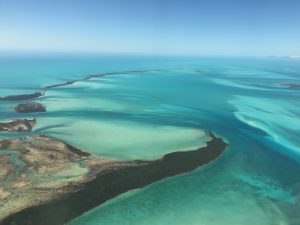The Exumas are a chain of 365 cays over 130 miles in The Bahamas, starting thirty miles southeast of New Providence. Great Exuma, at 60 kilometres long, is the largest and most populated island (about 7,000). Much of the beaches and sea in the area are preserved by the government under the Exuma National Land and Sea Park, protecting underwater limestone and coral reefs, drop-offs, blue holes, caves, and marine life.
I snapped this picture from the plane’s window upon approach in Jan 2019:

But Exuma is so much more than white sand beaches and Sapphire Bombay Gin blue waters. (And yes, those swimming pigs of internet fame, with their fondness for bum bites, and floating you-know-whats.)

Exuma is filled with locally-owned restaurants serving up heaping plates of grilled fish and a choice of sides, owners happy to sit down with you for a chat. It’s long strands of unpopulated beaches. It’s rake ‘n scrape bands at local fish frys or BBQs set up at the side of the road.
In short – gloriously unpretentious compared to the rich enclaves of New Providence.
I was introduced to Exuma by friends Glenn and Barb McInnes. Part-time residents of the island, Glenn and Barb made it their passion to explore the island, its history, and the people who called it home.
Whether that’s Santana’s Grill Pitt, an oceanside spot on Little Exuma owned by Denise “Dee” Rolle Styles, whose signature dish of grilled Bahamian lobster with fried onions and rice and peas is an island favourite. (Alas, not for me, with my shellfish allergy, but her grouper’s mighty fine too.)

Dee cooks what her husband catches that day. Next door at Mom’s Bakery, her mother instructs you to ladle rum kept warm on the stove over your already saturated cake. (Makes one hell of a breakfast, let me tell you.)
Glenn and Barb also introduced me to local artisan Yvonne McKenzie, who sells woven purses and satchels out of her house or the Georgetown market. And to the legendary Captain Jerry, a 5th generation Exumian whose mother was the Shark Lady of Hogs Cay, and who caught sharks with a hand line.
It’s hard to pinpoint Captain Jerry’s exact age; somewhere between 70 and 90, I’d guess. A lifetime spent in the sun has given his skin a weathered look, although he stands ramrod straight for hours as he pilots his twin-vee catamaran, transistor radio gently crooning songs from the 50s, along the waters of his grandparents and their grandparents before that.
There’s no one famous that has come through Exuma in his lifetime who Captain Jerry hasn’t piloted, including Johnny Depp, who filmed Pirates of the Caribbean there and stayed in Jerry’s villas. Rumour has it he’s been back to visit more than once but you won’t get any gossipy details from Jerry. He possesses an old-timer’s sense of propriety.

Jerry is an avid environmentalist, so a boat trip with him is a masterclass both in the history of The Bahamas as well as the natural world and its stewardship. In the 60s, he discovered an underwater cave system while snorkeling; when a film crew arrived on Great Exuma to shoot scenes for the 1965 James Bond movie Thunderball, they used the cave setting. (It was used again as location for Never Say Never Again; it’s one of the most stunning places I have ever snorkeled.)
Exuma was “settled” by loyalists escaping the American revolutionary war in 1783. Denys Rolle and then his son John, 1st Baron Rolle, turned the islands – themselves uninhabited for two hundred years after the Lucayans, the Indigenous peoples of The Bahamas, were wholly enslaved and removed by the Spanish – into a cotton plantation economy. The economy was a failure, and at emancipation in 1834, Rolle deeded all his Exuma land holdings to his slaves. (The Story of The Bahamas gives a more fulsome history of the region.)
The Bahamas is sandwiched between supply to the south and demand to the north, and so historically has found itself caught up in rum-running (during prohibition), drug smuggling (including Norman’s Cay, once owned by the Medellin Cartel), and of course as a haven for money launderers and the tax allergic. It’s worth noting that The Bahamas, unlike Canada, the US, and the UK, has instituted several laws in recent years aimed at greater transparency, including a beneficial registry to track who owns and ultimately controls corporations.
My second novel, a follow-up to Pull Focus, is set in Exuma and delves into these issues of power and wealth – including private banks, money-laundering, criminal enterprises, and the colonial legacies that brought us to where we are.

Very sadly, Barb McInnes passed away last year. She was a remarkable force for good in this world; in Ottawa, where she spent decades building the Ottawa Foundation, as well as across Canada and internationally as a philanthropist, board member, mentor, and community builder. For her leadership and hard work, Barb received the Order of Canada as well as other recognition. She was committed to executive mentoring of under-represented communities, and her family established a fund to continue that work. Donations can be made HERE.
Some of you may have watched the competing documentaries about the ill-fated Fyre Festival on Exuma in 2017 (which may just have influenced the festival backdrop in my novel. . .) Many local people worked flat out to construct lodging and provide food and were stiffed by the event organizer, fraudster Billy McFarland (currently serving a six-year sentence in federal prison).
Maryann and Elvis Rolle, owners of the amazing Exuma Point Bar and Grille, lost their life savings covering the cost of the food and staff wages. A GoFundMe page raised $237k USD to help reimburse them, although, in Maryann’s generous fashion, she gave away almost half of that to people in need.
Prompted by an epic snowfall and unusually frigid Toronto temperatures last week, as well as news of Omicron’s peak, I booked a trip for the end of February. Looking forward to being warmed by Exuma’s charm, once again.
Pull Focus
The audiobook version of Pull Focus recently launched!

Directed by Brenly Charkow, the book was narrated by actress Shannon Blanchet who did a remarkable job with the wide range of characters and accents in the novel. I met with Brenly and Shannon last August to talk through the book and all the various characters before they went into studio to record it.
Writing is a solitary pursuit, so I enjoyed both the book editing and production processes as well as the making of the audiobook. Reminded me happily of when I worked in film. @ECWAudio will post an interview with me about the audiobook process on their Twitter and Instagram social media accounts on January 30th.
**
I had a lot of fun chatting with radio and television personality Richard Crouse (Newstalk, CTV, CP24) about Pull Focus. HERE is a podcast of the show, in which he interviewed film critic Leonard Maltin and me.

Thank you to eBookNerdReviews for their lovely review of Pull Focus. “This book is perfect for anyone looking for an action-focused mystery/thriller with a strong female lead. It will satisfy your cravings for a feminist heroine and provide a good mystery to boot!”
News & Gossips
Publishing is difficult, at every stage of the process. Getting a book accepted for publication seems like the pinnacle of the climb, when in fact it’s only just the first hill. Media and booksellers are just as powerful gatekeepers as publishers themselves. I wrote about the challenges facing new and unknown writers in this Toronto Star op-ed, Don’t Judge A Book by Its Coverage. Culture is a business. I don’t think in Canada we acknowledge that reality enough, and thus ill-prepare writers to deal with it.

I enjoyed this Lit Hub article last week where writers provide a frank insight into the continual rejections that a writing career entails. US author Sam Lipsyte, possibly the most frank of all 🙂:
The bullshit never ends. That’s the main thing to remember. It never ends. The assholes are stronger in most ways. So you have to ignore them and just write and let that be the meaning of it all.
But the one I most relate to is the Pulitzer prize-winning Jennifer Egan. Having worked at a magazine, sat on many juries, and run mentoring programs, you realize just how subjective the process of evaluation really is:
[When I was a reader for The Paris Review,] I learned how many writers there were out there, and it was terrifying! But I also learned not to take the process too seriously. I figured that if I, a nobody in an un-airconditioned East Village apartment (batches of manuscripts were sent to me there), had the power to reject the slush pile, I couldn’t worry too much when my own stuff was rejected.
**
I was meant to be in Park City this week for the Sundance Festival and skiing, but that damn Omicron moved the festival to digital-only and I ended up not traveling.

Barry Hertz has a very good column in The Globe and Mail about the future of film festivals – how hard they’ve been hit, how important they are to the ecology of film, especially for independent film, and its Herculean effort to get media and audience attention in the giant vacuum created by studio movies, and whether the future of festivals is online, in-person, hybrid, or bust.
Cameron Bailey, TIFF’s newly minted CEO, is quoted as saying “We’re planning for an in-person festival and a return for the industry and everyone to Toronto. But we know how to do the other elements if and when we need to.” Fingers crossed for the return of the full TIFF experience come September.
(Bailey was the co-head of TIFF until last fall when the other co-head, Joanne Vicente, left to become CEO of Sundance and Bailey was promoted to CEO)
Meanwhile at Sundance, the first big sale of the festival (which opened January 20th) was for Fire of Love, a documentary and love story about two French scientists who died tracking the volcanoes that were their greatest passion. A fierce bidding war broke out among Netflix, Amazon, Sony Pictures Classics, Paramount, and several others; National Geographic Documentary Films won out, with a final figure not disclosed but rumoured to be seven figures. They plan to release theatrically later this year.
This Indiewire blog tracks news and reviews from Sundance (and ultimately the films coming to you via small or big screens later this year), if you’re interested.
**
For fans of the HBO show Succession (7 million for the last episode), star Brian Cox has a new memoir out, Putting the Rabbit in The Hat. Kirkus Reviews runs an interview with him HERE.
“I keep coming up against American actors who have to make [acting] a religious experience. Like that well-known story about Olivier telling Dustin Hoffman, running himself ragged during Marathon Man [because his character is tortured and kept awake]: “Dear boy, why not try acting?”
Bye for now. Thank you for joining me for this thirteenth issue of Letterbox. Please remember to:
